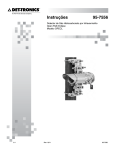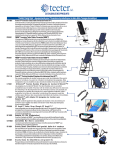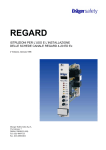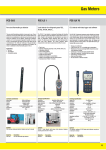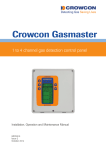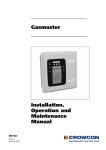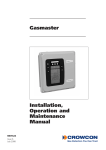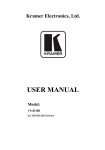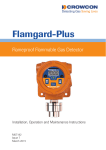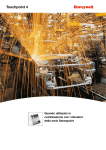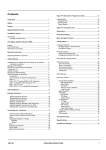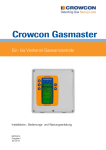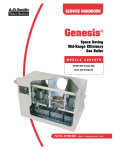Download Gasmaster (Old Style). - Sure-Safe
Transcript
Crowcon Reference: Gasmaster Manual Table of Contents 1. 1.1 1.2 2. 2.1 2.2 3. 3.1 3.2 3.3 3.4 3.5 3.6 4. 4.1 4.2 4.3 5. 5.1 5.2 6. 6.1 6.2 6.3 6.4 7. 7.1 7.2 7.3 8. 8.1 8.2 8.3 9. 10. INSTALLATION .................................................................................................................................................... 2 CONTROL UNIT ...................................................................................................................................................... 2 DETECTING HEADS ................................................................................................................................................ 3 SITING OF DETECTORS..................................................................................................................................... 4 GAS DETECTORS (SEE SECTION 7 FOR MORE INFORMATION) .................................................................................. 4 FIRE DETECTORS ................................................................................................................................................... 4 WIRING................................................................................................................................................................... 5 CABLE TYPES......................................................................................................................................................... 5 CABLE LENGTH...................................................................................................................................................... 5 EARTHING.............................................................................................................................................................. 5 ELECTRICAL CONNECTIONS (REFER TO DIAGRAMS 1 TO 3)..................................................................................... 6 ZENER BARRIERS AND GALVANIC ISOLATORS ..................................................................................................... 13 INPUT/OUTPUT/RELAY SETTINGS ........................................................................................................................ 13 TESTING............................................................................................................................................................... 15 INITIAL TESTING ............................................................................................................................................ 15 ALARM/RELAY OPERATION ................................................................................................................................. 16 ANALOGUE OUTPUTS ........................................................................................................................................... 16 CALIBRATION CHECKING ............................................................................................................................. 17 CROWCON GAS TEST KITS ................................................................................................................................... 17 CALIBRATION ADJUSTMENT................................................................................................................................. 17 SERVICE............................................................................................................................................................... 18 WARRANTY ......................................................................................................................................................... 18 COMMISSIONING AND SERVICE............................................................................................................................ 18 SENSOR REPLACEMENT ....................................................................................................................................... 18 SETTING DETECTORS ........................................................................................................................................... 18 GAS DETECTOR INSTRUCTIONS .................................................................................................................. 20 DI9, DI5/6 AND 81HD FLAMMABLE GAS DETECTORS ........................................................................................ 20 RGD90 TOXIC GAS AND OXYGEN DETECTORS ................................................................................................... 22 RGD90 THERMAL CONDUCTIVITY GAS DETECTOR ............................................................................................. 24 FLAMEPROOF GASMASTERS ........................................................................................................................ 25 DESCRIPTION ....................................................................................................................................................... 25 TESTING AND CALIBRATION ................................................................................................................................ 26 FIXING DIMENSIONS ............................................................................................................................................ 27 INTERNAL AND PANEL LAYOUT.................................................................................................................. 28 SPARE PARTS LIST ....................................................................................................................................... 30 File ref: Gasmaster Manual modified 071201.doc Issue 1, 7 December 2001 Page 1 Gasmaster Manual Crowcon Reference: 1. INSTALLATION Crowcon gas detection systems are fully tested and calibrated before they leave the factory. However, after installation we strongly recommend that full testing and commissioning is carried out. This is best done by Crowcon’s Service Department or by one of our distributors whose engineers have been trained by us. Rectification of installation faults can be an expensive exercise. 1.1 CONTROL UNIT The Gasmaster control unit is designed for wall mounting in any convenient non-hazardous location where a suitable power supply is available. (Gasmaster control units can be powered from 110V or 240V AC and 12 or 24V DC). Dimensions and fixing information are given below. (Special mounting instructions apply for flameproof models, see Section 7). To prevent dust and water ingress all cable entries and knock-outs must be checked and sealed if necessary. File ref: Gasmaster Manual modified 071201.doc Issue 1, 7 December 2001 Page 2 Gasmaster Manual Crowcon Reference: 1.2 DETECTING HEADS a) Flammable 96HD, DI9, DI5/6, (81HD and high temperature version 73HT) and Thermal Conductivity (TCgard) Detectors These detectors are flameproof and can be installed in a hazardous area (Zones 1 and 2). Normally, they are supplied complete with a metal junction box and 96HT is supplied with 300mm of mineral insulated cable fitted with a 20mm threaded gland to enable the detector to be mounted in a hot compartment. (Note that 96HD is the detector usually supplied with Gasmaster, 81HD and DI9 having been superseded). b) TXgard IS (Formerly RGD90) Toxic and Oxygen Detectors Most of this range of detectors are intrinsically safe and can be used in hazardous areas (Zones 0, 1 and 2, Gas Groups IIA, IIB, IIC) providing there is a zener barrier between them and the control unit. A zener barrier is not necessary if the detector is in a non-hazardous area. NOTE: The TXgard range includes carbon monoxide, hydrogen sulphide, chlorine, sulphur dioxide, acid gas, nitric oxide, nitrogen dioxide, hydrogen, hydrogen cyanide and ammonia versions. c) TCgard Thermal Conductivity Detectors These detectors operate on three wires and are intrinsically safe when connected through the specified zener barrier, allowing them to be installed in hazardous areas (Zones 0, 1 or 2). The detectors use the thermal conductivity principle to monitor the percentage by volume level of a range of gases including methane, hydrogen, carbon dioxide, helium and halon in air or binary mixtures of these gases. d) Gaslink Flammable and Toxic/Oxygen Detectors Gaslink is an obsolete intrinsically safe range of detectors providing a 4-20mA output and having a built-in LCD display. Flammable versions are three wire operation and require two zener barriers whilst the toxic gas and oxygen versions operate in the same way as RGD90 toxic/oxygen. e) Smoke and Heat Detectors Fire detectors may be supplied in standard or intrinsically safe form. The latter can be located in a hazardous area (Zones 0, 1 or 2) providing a zener barrier is connected between them and the control unit. f) Environmental Sampling Unit (87 ESU) This has been designed primarily to monitor heavy gases such as chlorine or propane (LPG) which because of their nature flow to low points and do not diffuse readily in the general atmosphere. The equipment comprises a sampling chamber, an explosion proof electric fan and collecting pipes. The 12v fan is approved to EExm IIC T4 which allows the ESU to be used in hazardous areas, zones 1 and 2, gas groups IIA,IIB,IIC. A Gasmaster input/alarm card type ESU supplies a fused 12v to drive the 87 ESU and includes fan failure alarm sensing with relay outputs. File ref: Gasmaster Manual modified 071201.doc Issue 1, 7 December 2001 Page 3 Gasmaster Manual Crowcon Reference: 2. SITING OF DETECTORS 2.1 GAS DETECTORS (SEE SECTION 7 FOR MORE INFORMATION) In siting remote gas detectors, each case must be considered individually and Crowcon will provide any necessary advice and assistance (also refer to BS6959: 1988). In general, for gases lighter than air the detectors should be above the area where leaks are likely and for gases heavier than air, the detectors must be at floor level or in inspection pits or ducts into which heavy gas may flow. However, not all cases are as simple. For example, if carbon monoxide which is only slightly lighter than air is under pressure and is suddenly released into the atmosphere a drop in temperature is caused resulting in an increase in density. This may cause the gas to fall to floor level. Also, the nearer in density to air a gas is, the more easily it will flow with air due to draughts, ventilation etc. Therefore a compromise with gases like carbon monoxide and also gases only slightly heavier than air such as hydrogen sulphide and nitric oxide, is to mount the detectors at a height as close as possible to the breathing area of personnel being protected. When monitoring deficiency of oxygen, which is slightly heavier than air, it is necessary to consider what might be displacing it. For example, carbon dioxide which is heavier than air will sink to floor level so this is where the detectors should be. Conversely, if helium is displacing the oxygen, the detectors should be mounted at a high level. On the other hand, if combustion is consuming oxygen, the whole volume of air would gradually become depleted in oxygen and detector location would not be so critical. When installing gas detectors it is advisable to ensure that the gas inlet is not exposed to liquid or dust contamination, for example, by positioning the unit downwards (splash deflectors should be used when water or other liquid is continually present). 2.2 FIRE DETECTORS The location of smoke and heat detectors is usually governed by local Codes of Practice such as BS5839 Part 1, FOC or NFPA regulations. In general, smoke detectors can be mounted up to 15m high and cover a maximum area of 100m2 and heat detectors should be no more than 9m high and cover an area no more than 50m2. Escape routes should have more than the minimum number of detectors. Normally 20 detectors per zone is considered a maximum. Each Gasmaster fire channel will operate one fire zone. File ref: Gasmaster Manual modified 071201.doc Issue 1, 7 December 2001 Page 4 Crowcon Reference: Gasmaster Manual 3. WIRING Because of the low signal levels carried by wiring between gas detectors and their control unit, it is essential not to run cabling near high power electrical equipment. 3.1 CABLE TYPES Flammable 96HD, DI9, DI5/6, (81HD and 73HT) and thermal conductivity (TCgard) detectors require 4 core cable. These detectors are flameproof and in hazardous areas must be wired in mineral-insulated (e.g. BICC 4L1) or steel wire armoured (e.g. BICC 6944) with suitable glands and accessories. TXgard toxic and oxygen detectors are two wire devices whereas TCgard is a three wire device. Because they are intrinsically safe rather than flameproof, it is not essential to use flameproof cable but it is to be recommended for mechanical protection. Screening is also usually necessary. Fireproof cable (e.g. Pirelli FP200) is often used for these detectors and is also suitable for fire detectors. 3.2 CABLE LENGTH The maximum loop resistance depends on the detector type and the following data assumes the use of cable with 1mm2 conductors. Maximum length. Maximum loop resistance . 96HD,DI9 ,DI5/6, 81HD, 73HT 370m 12.5ohms Gaslink Flammable Gaslink Toxic Oxygen TXgard Oxygen TCgard Fire Detectors 18m IIC 146m IIB 3.8ohms with zener barrier type Z731 1100m 700m 290m 2900m 390ohms with zener barrier type MTL+728 (otherwise 730ohms) 24ohms with zener barrier type MTL+715 (otherwise 180ohms) 10ohms with zener barrier (otherwise 165ohms). 100ohms with zener barrier NOTE: Wiring continuity tests must be carried out with detecting heads disconnected. 3.3 EARTHING Intrinsic safety earthing must be used as required. Because of the low signal levels generated by gas detectors it is usually necessary, to avoid all risk of interference, to connect the screen of the cable to the earth plate of the detector head (long reach glands and/or the screen terminals should be used). Earth loops must be avoided so earthing is done through the zener barrier or the normal safety earth of the system. The zener earth link on the power supply/alarm PCB in the control unit must be correctly set (see diagram 4). File ref: Gasmaster Manual modified 071201.doc Issue 1, 7 December 2001 Page 5 Gasmaster Manual Crowcon Reference: 3.4 ELECTRICAL CONNECTIONS (REFER TO DIAGRAMS 1 TO 3) Connections are shown by numbered screw terminal blocks. A diagram on the rear of the front door is also provided to assist in installation. a) Terminals at the top of the case are for relay connections, whilst terminals at the bottom are for mains input, external DC input, external battery, detecting heads, analogue drive and alarm units. b) Output Relays are DPCO and are isolated from the system power supply and are rated at 240V AC, 5A. c) Detectors are set up at the factory with their own input/alarm card and it is essential that detectors and input/alarm cards are matched. Therefore detector 1 must be connected to input/alarm card 1, detector 2 must be connected to input/alarm card 2, etc. NOTE: TXgard detectors may or may not have shorting links fitted between the blue and green sensor leads which should be removed just before commissioning. File ref: Gasmaster Manual modified 071201.doc Issue 1, 7 December 2001 Page 6 Crowcon Reference: Gasmaster Manual DIAGRAM 1 - ELECTRICAL CONNECTIONS File ref: Gasmaster Manual modified 071201.doc Issue 1, 7 December 2001 Page 7 Crowcon Reference: Gasmaster Manual DIAGRAM 2 - ALARM CONNECTIONS File ref: Gasmaster Manual modified 071201.doc Issue 1, 7 December 2001 Page 8 Crowcon Reference: Gasmaster Manual DIAGRAM 3A - DETECTING HEAD CONNECTIONS (96HD, DI9, RGD90/TOXIC, OXYGEN) File ref: Gasmaster Manual modified 071201.doc Issue 1, 7 December 2001 Page 9 Crowcon Reference: Gasmaster Manual DIAGRAM 3B - DETECTING HEAD CONNECTIONS (TCgard, 82HD) File ref: Gasmaster Manual modified 071201.doc Issue 1, 7 December 2001 Page 10 Gasmaster Manual Crowcon Reference: DIAGRAM 3C - DETECTING HEAD CONNECTIONS (FIRE) File ref: Gasmaster Manual modified 071201.doc Issue 1, 7 December 2001 Page 11 Gasmaster Manual Crowcon Reference: DIAGRAM 3D - DETECTING HEAD CONNECTIONS (GASLINK) File ref: Gasmaster Manual modified 071201.doc Issue 1, 7 December 2001 Page 12 Gasmaster Manual Crowcon Reference: 3.5 ZENER BARRIERS AND GALVANIC ISOLATORS When gas detectors fire detectors are used in a hazardous area an appropriate zener barrier or galvanic isolator as follows is used. TXgard Toxic or Oxygen Any shunt zener barrier certified by BASEEFA EExia IIC with an output not exceeding 15.7V and 166mA or the MTL3041 or MTL 5041 galvanic isolator. Series 60 Smoke or Heat Any shunt zener barrier certified by BASEEFA EExia IIC with an output not exceeding 28V and 94mA or the MTL3043 or MTL 5061 galvanic isolator. TCgard Dual channel zener barrier MTL767+ or STLE933+. Gaslink Flammable A specially designed barrier/interface must be used type Pepperl+Fuchs Z731 3.6 INPUT/OUTPUT/RELAY SETTINGS Gasmaster control units are supplied as standard set as follows:- Mains input - 240V AC Analogue output - 4 to 20mA Common low, high alarm and fault relays - normally energised (fail safe) Individual channel low and high alarm relays - normally de-energised Zener earth - assumes no zener barriers used. These settings can be changed by re-positioning links on the printed circuit boards as shown in Diagram 4. File ref: Gasmaster Manual modified 071201.doc Issue 1, 7 December 2001 Page 13 Crowcon Reference: Gasmaster Manual DIAGRAM 4 - INPUT/OUTPUT/RELAY LINKS File ref: Gasmaster Manual modified 071201.doc Issue 1, 7 December 2001 Page 14 Gasmaster Manual Crowcon Reference: 4. TESTING 4.1 INITIAL TESTING Carry out the following with the detectors in normal air:1. With detectors connected to the control unit but with no ancillary equipment connected, connect mains or external DC power (either 12 or 24V). Connect the internal battery connector to the power supply PCB. The green power and battery indicators and displays should be on, and some alarm lamps may be lit. If any fault lamps are lit there is probably a cable fault between the Gasmaster and the detector. If there is no cable fault there could be a fault in the detector or zener barrier. NOTE: The alarm relays for a channel in fault condition are inhibited. If any TXgard detectors are supplied with the system the shorting link (if fitted) must be removed and the system should be left powered overnight to allow the detectors to stabilise. 2. The red LED display shows gas concentration. In the case of Gasmaster 1 the reading is shown continuously and with Gasmaster 4 the reading for each channel is shown in turn for 5 seconds when in the ‘Run’ mode. (The reading for each channel can be selected manually by means of the ‘Hold’ push switch). The green display shows the scale of the gas concentration reading (in parts per million, % of the Lower Explosive Limit or % volume, depending on the gas being monitored). Press ‘Run’ until the green display indicates C1 (Channel 1) then press ‘Hold’. If the reading is not zero, adjust the ‘Zero’ control for that channel. Press ‘Run’ again to select C2 and set zero. Continue for all channels being used. NOTE: If the system has any oxygen detectors, set the reading to 20.9% when the oxygen channels are selected using the ‘Cal’ control. Do not attempt to zero oxygen channels in air. Fire detector channels give no meter reading and have a nonadjustable alarm point. 3. With all channels zeroed (or set to 20.9% for oxygen detectors) press the ‘Accept/Reset’ switch on the front panel when all alarm indicators should go out. 4. The Low Level alarm and High Level alarm levels are normally factory set but they can be checked or reset. Select the channel to be tested and slowly rotate its zero control clockwise. At a pre-set level of gas concentration the low level indicator and the audible alarm in the Gasmaster will operate. The audible alarm can be cancelled by the ‘Accept/Reset’ switch, continue turning and the high level indicator will operate. The readings at which alarms are triggered can be checked or, if necessary, reset using the ‘Set L’ or ‘Set H’ controls. 5. The best way to do this is to turn the ‘Set L’ and ‘Set H’ controls fully clockwise. Set the level on the display at which the low level alarm is to operate using the ‘Zero’ control. Then slowly turn the ‘Set L’ control anti-clockwise until the alarm indicator lights. Repeat with the high alarm level using ‘Set H’. Reset the zeros after this procedure by turning the ‘Zero’ controls anti-clockwise. When satisfactory operation of the system has been proved, connect any external equipment and check its operation. File ref: Gasmaster Manual modified 071201.doc Issue 1, 7 December 2001 Page 15 Gasmaster Manual Crowcon Reference: NOTE: In mains fail conditions the Power indicator flashes on and off twice per second. 6. The ‘Lamp Test’ push switch checks the internal audible alarm and indicators. For safety reasons it does not activate alarm or fault relays or Yodalights connected to the sounder/beacon terminals. 7. Press ‘Run’ for normal operation of Gasmaster 4. 4.2 ALARM/RELAY OPERATION a) If gas above the low alarm level is detected, the low level alarm LED for the relevant channel illuminates, the channel low alarm relay changes and the internal sounder is heard. In addition the master low alarm relay changes and if one or two Yodalights are connected to the sounder/beacon output terminals, their sounders and beacons operate. b) This condition can be ‘accepted’ by pushing the ‘Accept/Reset’ switch which silences the internal and external sounders (but the Yodalight beacon remains on) and resets the master low level alarm relay (but channel relays remain in the alarm state). The master low alarm relay will change to the alarm state again if another channel detects gas above the low alarm level. c) If the gas concentration increases above the high alarm level, the relevant channel high level alarm LED illuminates, the channel high alarm relay changes and the internal sounder is heard. In addition, the master high alarm relay changes. Yodalight sounders and beacons will also operate. The high alarm state can be accepted as in b) above when sounders are silenced and master alarm relays reset. The master high alarm relay will change to the alarm state again if another channel detects gas above the high alarm level. It is recommended that alarm sounders etc which are required to be silenced on ‘accepting’ an alarm state are connected through the master relays. Any equipment which needs to remain operational after ‘accepting’ an alarm should be controlled by the channel relays which can be connected in series or parallel as required. d) When gas is no longer present, pressing the ‘Accept/Reset’ switch resets all alarms and relays. In the case of fire detection the indicators and alarm relays have similar functions except that there is only one alarm level for each zone. A fire alarm can be simulated during testing by triggering a smoke detector by smoke or freon aerosol. Fire detectors automatically reset when fire symptoms cease. 4.3 ANALOGUE OUTPUTS A 12V 4-20mA output or 1-5V output is available from each channel (maximum total loop resistance 150 ohms). Calibration of these outputs with test gas should be carried out when they are used, rather than the control unit display. If using the analogue outputs it may be preferable to calibrate the system to these rather than the control unit display as the resolution of the outputs is better than the display. File ref: Gasmaster Manual modified 071201.doc Issue 1, 7 December 2001 Page 16 Crowcon Reference: Gasmaster Manual 5. CALIBRATION CHECKING 5.1 CROWCON GAS TEST KITS The operation of Crowcon gas detection systems is easily checked by means of gas test kits. The basic kit consists of a fine control valve, flow indicator, hose and adaptor with full instructions. The valve fits our standard 20 litre gas cans which can be supplied containing standard mixtures suited to our various models (see table). The flow indicator ensures that gas is not wasted during the test procedure. Properly used a 20 litre can will last for 30-45 minutes, enough for many tests. Crowcon also supply a pressure gauge to check the contents of the gas can. Other mixtures are available to special order. Gas Mixture 1.25% and 2.5% methane in air 0.75% pentane in air 200 ppm carbon monoxide in air 25 ppm ± 5 ppm hydrogen sulphide in air 10 ppm sulphur dioxide in air Freon aerosol Detectors Suitable For 81HD, 73HT, DI9, DI5/6 81HD, 73HT, DI9, DI5/6 RGD90/CO RGD90/HS RGD90/SO Series 60 Smoke Detectors NOTE: Gas mixtures supplied in 20 litre cans are usually not as precise in concentration as the mixtures used for factory calibration and they deteriorate with age. 5.2 CALIBRATION ADJUSTMENT Gasmaster systems are supplied factory calibrated and there is no need for re-calibration on commissioning although functional testing is a good idea using the gas test kits. After 6 months service re-calibration is recommended. Each alarm module has a ‘Cal’ control for setting calibration while the detector is sensing gas of known concentration. Great care is needed during this procedure and it is recommended that Crowcon engineers or other experienced personnel carry it out. Crowcon’s range of detectors includes models for chlorine, nitrogen dioxide and nitric oxide. Because of the nature of these gases, special methods of calibration have to be employed. File ref: Gasmaster Manual modified 071201.doc Issue 1, 7 December 2001 Page 17 Gasmaster Manual Crowcon Reference: 6. SERVICE 6.1 WARRANTY Crowcon products are designed to give years of trouble-free life and our normal guarantee is one year. In the unlikely event of one of our systems failing within one year, we will repair and replace any faulty parts, free of charge, providing that the equipment has not been misused. 6.2 COMMISSIONING AND SERVICE Crowcon strongly recommend that fixed gas detecting installations are commissioned. Commissioning includes carrying out a full check of the equipment and its wiring as well as calibration and operation checks on all detectors. Our Service Department will also be pleased to advise on regular service and maintenance requirements and we can offer annual maintenance agreements. Similar arrangements can be made by our sales and service distributors outside the United Kingdom. 6.3 SENSOR REPLACEMENT Pellistor sensors (used in 96HD, 81HD, 73HT, DI5/6, DI9 detectors) and thermal conductivity sensors do not have a wear-out mechanism. However, pellistors can be poisoned and then require replacement because of reduced sensitivity. Pellistors can be changed on site, although some difficulty may be encountered in undoing the sensor head. Electrochemical sensors used in toxic gas detectors need replacing about every two years while oxygen cells have a life of one year. Crowcon supply the replacement cells and removal and refitting is easily accomplished. Crowcon operate a factory detector repair scheme. 6.4 SETTING DETECTORS a) 96HD, DI9, DI5/6 and 81HD Detectors Check from the equipment specification which type of pellistor is used. The standard VQ21T sensor should give 2.05V* at terminal 1 (black) and 3 (red) in the detector junction box. (The voltage must be checked at the detector, not at the control unit). Adjustment is done by means of the ‘Head Volts’ control on the input/alarm card. Apply calibration gas (e.g. 2.5% methane in air which is 50% LEL) to the detector at a rate of no more than 0.5 litre per minute. Adjust the ‘Cal’ control on the input/alarm card to give the correct reading. * Check with Crowcon for other types of pellistor. b) TXgard and TCgard Detectors File ref: Gasmaster Manual modified 071201.doc Issue 1, 7 December 2001 Page 18 Gasmaster Manual Crowcon Reference: The electrochemical sensors in RGD90 detectors polarise if the system is not operating, e.g. during mains failure, if there is no standby battery. This causes a delay in obtaining a stable output when the sensor is operational again. If a detector is to be out of commission a shorting link should be connected between the blue and green sensor leads, in order to prevent polarisation. To set the zero of an RGD90 detector a digital meter (which must be intrinsically safe if the area is hazardous) is first connected to the test point on the head amplifier in the detector junction box. In normal air the reading should be 40mV and the head amplifier zero control should be adjusted to give this reading. The zero control on the input/alarm card should now be set to give a zero reading on the display. Apply calibration gas to the detector at a rate of no more than 0.5 litre per minute. Flow the gas for one minute and adjust the ‘Cal’ control on the head amplifier in the detector junction box until a reading of 200mV is obtained at the test point for gas at full scale concentration or 120mV for gas at half scale concentration. Adjust the ‘Cal’ control on the input/alarm card to obtain the appropriate reading on the display. c) TXgard-OX Detector Connect a digital meter to the test point on the head amplifier in the detector junction box. Remove the red sensor lead from the terminal block and set the zero control to give a reading of 40mV. Adjust the zero control on the alarm card to give a zero reading on the display. Reconnect the red lead and allow 5 minutes for the sensor to settle. Adjust the ‘Cal’ control on the head amplifier in the detector junction box to read 175mV in normal air. Adjust the ‘Cal’ control on the input/alarm card to obtain a reading of 20.8% on the control display. d) Gaslink See separate instructions supplied with detector. e) Environmental Sampling Unit (87 ESU) Switch on power, alarms may be on, reset by pressing reset/accept button on front panel. SLOW LED indicates low voltage or fan obstruction. Channel and low master relay will operate. Master relay can be accepted by front panel accept/reset switch. STOP LED indicates fan blades obstructed or fallen off. Channel and high master relay will operate. Master relay can be accepted by front panel accept/reset switch. FAULT LED indicates blown fuse on input card. This must be replaced by the same type due to certification requirements for this unit to be used in a hazardous area, see spare parts list. The Gasmaster meter display for this channel will only indicate zero ‘0’. File ref: Gasmaster Manual modified 071201.doc Issue 1, 7 December 2001 Page 19 Crowcon Reference: Gasmaster Manual 7. GAS DETECTOR INSTRUCTIONS 7.1 96HD, DI9, DI5/6 AND 81HD FLAMMABLE GAS DETECTORS These gas detectors are designed for the detection of flammable gases up to the lower explosive limit (LEL). They are flameproof and must be used with a suitably approved junction box and cabling. Principle of Operation The detectors use catalytic pellistor sensors. These consist of two elements, one of which is the sensor and the other the reference. They are connected in two arms of a Wheatstone Bridge and are maintained at about 500ºC. In the presence of a flammable gas, combustion occurs on the catalytic surface of the sensor and the heat of reaction increases its temperature. This increases the resistance of the element which unbalances the bridge. Siting Detectors should be located where concentrations of flammable gas are most likely to occur:a) Detectors should be mounted close to the floor for heavier than air gases such as butane or propane and near to the roof to detect lighter than air gases such as methane or hydrogen. b) Heavy gases are likely to accumulate in sumps and trenches whilst light gases will rise into the apex of a roof. c) Valves, flanges and compressor bearing seals are potential sources of leakage. d) Detectors should be positioned pointing vertically downward and be protected with a weatherproof cap/spray deflector if there is a risk of water spray or dust. e) Detectors will lose sensitivity if located in an area where catalyst poisons such as silicones, lead organics, chlorine or sulphur compounds are likely to be present. f) Sensitivity and balance of the Wheatstone Bridge may also be affected by long term exposure to levels of flammable gases above the upper explosive limit (UEL). Electrical Detectors are supplied with three or four leads for connection as shown. It is important that the correct voltage is applied to the detector which will depend on the type of pellistor fitted:PELLISTOR TYPE VQ1 VQ2 OR 2OON VQ8 VQ16 VQ21T VQ22 VQ25 BRIDGE VOLTAGE 2.0 2.0 2.5 2.5 2.0 2.0 2.0 POWER (W) 0.75 0.36 1.1 (resists lead) 1.1 (poison resisting) 0.75 (poison resisting) 0.36 (poison resisting) 0.75 (resists chlorine but not suitable for methane) The voltage must be measured in the junction box between the red and black leads and should be accurate to ± 0.1V. Mechanical File ref: Gasmaster Manual modified 071201.doc Issue 1, 7 December 2001 Page 20 Crowcon Reference: Gasmaster Manual 96HD, DI5/6 and 81HD detectors are repairable in that the pellistors and sinter assembly may be replaced. Since the unit is certified flameproof this work should only be carried out by Crowcon or one of their approved Service Agents. Replacement of the sinter may be required if it has become blocked with dust or oil which causes the response to test gas to be slow and the sensitivity impaired. The DI9 is fully encapsulated and is therefore non-repairable. Recalibration Detectors should be checked with a test gas at least 6 monthly. The test gas should be applied using either the calibration adaptor or through the spigot of a weatherproof cap. The flow rate of the test gas should be 0.5 litres per minute. Crowcon’s gas test kits are a convenient way of providing test gas. Accessories DI5/6 (or DI8) Calibration cap Remote calibration adaptor Spray deflector/weatherproof cap Flow adaptor Collector cone Carbon filter Swivel mounting bracket CO1501 MO4253 CO1502 CO1503 CO1254 CO1340 DI9, 81HD (or 82HD) CO1501 CO1300 CO1052 CO1057 CO1051 CO1254 CO1340 96HD, DI9, DI5/6, 81HD CONNECTION DIAGRAM IK is the usual resistor fitted to 81HD, 27R being only for 73GW, 74GW, or 72FP systems (this version is called 81HD/LR). File ref: Gasmaster Manual modified 071201.doc Issue 1, 7 December 2001 Page 21 Gasmaster Manual Crowcon Reference: 7.2 TXGARD TOXIC GAS AND OXYGEN DETECTORS These detectors employ electrochemical sensors installed in a junction box which contains an amplifier/transmitter to provide a 2 wire 4-20mA output (sink, not source). They can be used in hazardous areas in conjunction with a suitable zener safety barrier. For operation an input of 7.0 to 32V DC is required (terminal 3 positive). Maximum cable loop resistance is 180 ohms. Most TXgard detectors can be mounted in any orientation but attention must be paid to the physical characteristics of the gas being measured (density etc). Exceptions to this are acid gas (HX) detectors. They must be installed with the sensor pointing down at 45º. If a liquid blob appears on the membrane of the HX type do not remove it. Notes Electrochemical sensors need to be operating under powered conditions for a few hours before calibrating or zeroing. Pay particular attention to this when commissioning systems with nitric oxide (NO), hydrogen chloride (HCL) and ammonia (NH3) detectors. Calibration and Zeroing Connect a DVM to the test points on the amplifier in the junction box. Adjust the zero control to give 40mV at the test points in clean air. Apply calibration gas at no more than 0.5 litre/min (using a Crowcon gas test kit or similar). Flow the gas for one minute and adjust the ‘Cal’ control to obtain 120mV for half full scale gas at the test points. Calibration and Zeroing TXgard-OX (oxygen type) Adopt a similar procedure but set zero with the red sensor lead removed from the terminal block. Replace the lead and wait for 5 minutes before adjusting the ‘Cal’ control to give 175mV at the test point in normal air. Replacement of Sensors Because the various sensors have different outputs a ‘header’ matched to each sensor, which is plugged into the amplifier PCB, is used to provide sensor to amplifier compatibility. TXgard-OX uses a different amplifier. Toxic gas sensors have a two to three year life. At the end of their life they are replaced by a complete sensor assembly. This consists of the sensor in its housing and a new header. Use of the new header ensures compatibility between a new sensor and the amplifier in case the sensor specification has changed. Oxygen sensors last for one year and again the whole sensor assembly is replaced. Care must be taken that the shorting link/sleeve is not removed from the toxic gas sensors until 30 minutes before they are installed in their detecting head and connected to the amplifier. If this is not adhered to, polarisation of the sensor occurs and the detector must then be left overnight before re-calibration of the detector is attempted. Nitric oxide, hydrogen chloride and ammonia sensors do not have shorting link/sleeves. File ref: Gasmaster Manual modified 071201.doc Issue 1, 7 December 2001 Page 22 Crowcon Reference: Gasmaster Manual Fitting Instructions for Replacement Sensors 1. Make sure power to unit is off. 2. Disconnect the two or three sensor wires and unscrew the whole sensor housing from the junction box. 3. Remove amplifier lid and remove amplifier from junction box. Change the plug-in header, ensuring notch in header matches notch in mounting. 4. Fit a new sensor assembly. Replace the leads, observing the colour code. 5. Allow a few hours for the detector to stabilise, then zero and calibrate. ELECTRICAL CONNECTIONS File ref: Gasmaster Manual modified 071201.doc Issue 1, 7 December 2001 Page 23 Crowcon Reference: Gasmaster Manual 7.3 THERMAL CONDUCTIVITY GAS DETECTOR The TCgard is a thermal conductivity gas detector suitable for measuring flammable gases in percentage levels as well as certain non-flammable gases and binary gas mixtures. This relies on there being a substantial difference between the thermal conductivity of the two gases being measured. The thermal conductivity sensor is screwed into a plastic junction box which contains an amplifier/transmitter providing a three wire output, 2 wire power and 1 wire signal (4-20mA sink) with shared 0V. The sensor consists of two matched elements which operate on the thermal conductivity principle. The sensing element is exposed to the gas and the reference element is sealed off in a reference gas (air) in a separate chamber. The out of balance signal generated by the concentration of gas is amplified and converted into a 4-20mA signal. Electrical Connections A 6-way terminal block provides all of the connections to the TCgard detecting head. The lower three terminals marked orange/red/blue are internally connected to the thermal conductivity sensor, the upper three terminals marked -, + and signal are connected to the control equipment:- GASMASTER TERMINALS TCgard 1 2 3 - not used 4 Signal + Setting Up Allow detecting head to stabilise for 1-2 hours after powering up, before any attempt is made to calibrate or zero. Connect a DVM to the test points on the amplifier in the junction box. Zero should give a reading of 40mV and full scale should give a reading of 200mV. Zero The zero should be re-checked by passing a sample of the background gas into the sensor at a flow rate of 100ml/min. Check the amplifier label for details of the background gas, normally air but possibly nitrogen, carbon dioxide and argon. Any inaccuracies in zero setting can be corrected by adjusting the zero pre-set on the amplifier to make the DVM read 40mV. File ref: Gasmaster Manual modified 071201.doc Issue 1, 7 December 2001 Page 24 Gasmaster Manual Crowcon Reference: Calibration The calibration of the detecting head can be checked by passing a sample of the span gas into the sensor at a flow rate of 100ml/min. Any inaccuracies in calibration setting can be corrected by adjusting the ‘Cal’ pre-set on the amplifier to make the DVM read 200mV. If the control equipment display needs adjusting, the relevant procedure is covered in the operating manual for that equipment. Sensor Care should be taken to prevent water or water droplets from entering the sensor, and the sensor must not be connected to a high pressure gas source. Sensor Replacement Make sure the power to the unit is off. Disconnect the three sensor wires from the terminal block inside the junction box and unscrew the whole sensor housing from the junction box. Fit a new sensor assembly. Replace the leads observing the colour code. Remove amplifier fixing screws and rear lid to gain access to electronics and BAL pre-set VR3. Connect DVM between the red and orange terminals, switch on power and adjust BAL pre-set to make the DVM read zero mV. Re-assemble amplifier, allow 1-2 hours for detector to stabilise, then zero and calibrate (see Setting Up instructions). 8. FLAMEPROOF GASMASTERS 8.1 DESCRIPTION The Flameproof Gasmaster GMS/FP offers the same facilities as the standard Gasmaster but instead of being packaged in a slim wall mounted box, is mounted in a cast aluminium or iron flameproof enclosure. The flameproof Gasmaster is certified to EExd IIB T6 so can be mounted in Zones 1 or 2. Access to the internal printed circuit boards of the flameproof Gasmaster is by removing the twelve lid retaining bolts and swinging the lid open on its hinges. The lid can be lifted of its hinges if required. The flameproof Gasmaster must be completely de-energised before the lid is opened. Sufficient threaded cable entries are provided; it is important to install flameproof cable glands to maintain the integrity of the flameproof certification. File ref: Gasmaster Manual modified 071201.doc Issue 1, 7 December 2001 Page 25 Gasmaster Manual Crowcon Reference: The flameproof Gasmaster uses the same power supply, alarm cards and input cards as the standard Gasmaster with the following modifications:1. A back-up battery is not connected to the power supply. 2. The fire/smoke alarm card has a zener barrier mounted directly on the PCB and the alarm relays are normally energised (see page 23 for the electrical connections and link options). 3. On initial switch on, the alarm relays are automatically inhibited for five seconds, allowing the detecting heads to settle down. The display PCB has been specially configured for use in flameproof enclosures, with all of the status LEDs, channel indicators and digital readouts clustered together on a small sub-display card. This sub-display card can be unplugged from the main display PCB and rotated through 90º, 180º or 270º, then plugged back in so that the display is always the right way up, irrespective of the orientation of the enclosure. The circuitry which controls four push buttons for TEST, RESET, HOLD and RUN functions is also located on the main display PCB. With the lid of the enclosure in place, plungers from the lid mounted buttons break an infra-red beam when they are pushed. With the lid removed, small PCB mounted push buttons beside the infra-red sensors can be used for testing purposes, or the beam can be broken using a pencil or similar opaque object. (A connector on the PCB allows for remote switches to be fitted for OEM installations). See page 24. 8.2 TESTING AND CALIBRATION Only basic system testing can be performed with the lid in place:1. Lamp operation can be checked by pressing the TEST button and viewing the sub-display board through the window. 2. Apply test gas to the detecting heads or simulate a fire/smoke condition to check the operation of the measuring and alarm circuits, and the RESET button. 3. The HOLD and RUN buttons can be used to check the cyclic operation of the LED digital displays. To perform full test and calibration procedures as described in Sections 4 and 5, it will be necessary to open or remove the lid of the flameproof enclosure. As stated before, the flameproof Gasmaster must be completely de-energised before the lid is opened and a permit must be obtained before an open system can be re-energised in a hazardous area. Once the lid is open, access to the lower set of PCBs is made by gently hinging the main display board to one side. The board can be unclipped from both brackets if required, but it is simpler to leave one bracket attached and use this bracket as a hinge. The system can now be tested and calibrated in accordance with Sections 4 and 5. File ref: Gasmaster Manual modified 071201.doc Issue 1, 7 December 2001 Page 26 Gasmaster Manual Crowcon Reference: 8.3 FIXING DIMENSIONS File ref: Gasmaster Manual modified 071201.doc Issue 1, 7 December 2001 Page 27 Crowcon Reference: Gasmaster Manual 9. INTERNAL AND PANEL LAYOUT 1 2 3 4 Standby Battery (Sealed Lead Acid) Standby Battery Connector SK1 Toroidal Transformer Internal Sounder 16 17 18 19 5 Mains Fuse 20mm 250mAA/S (F1) 240V 6 DC Fuse 20mm 2A Q/B (F2) 7 Battery Fuse 20mm 2A Q/B (F3) 20 21 22 8 External Sounder/Beacon Fuse 20mm 1 AQ/B (F4) 9 Common Low Alarm Relay 10 Common High Alarm Relay 11 Common Fault Alarm Relay 12 Common Low, High Field Terminals 13 Common Fault Alarm Terminals 14 Mains Input Terminals 15 External DC/Battery, Sounder Beacon Terminals 23 Main Earth/Chassis Stud Low Alarm Channel Relay High Alarm Channel Relay Channel Relay (Low High) Terminals Analogue Output Detecting Head Terminals Input Card 4-20mA Input Card Explosive Input Card Fire Alarm Card (ALL GASES) 24 25 26 27 28 29 30 High Alarm LED (FIRE) Low Alarm LED (FIRE) Fault Alarm LED Calibration Preset (CAL) High Alarm Preset (SET H) Low Alarm Preset (SET L) Zero Preset (ZERO) 31 32 33 34 Pellistor Voltage Preset (Head Volts) Write On Pad Gas/Fire Detector Location Write On Calibrated Range Of Detector High Alarm Set Point 35 Low Alarm Set Point 36 Sensor Type Fitted 37 Remote Accept/Reset Terminals a b c d e Main Power Supply and First Channel Alarm Card (shown with gas card) Channel 2 Position (shown with gas card) Channel 3 Position (shown with fire card) Channel 4 Position (shown spare) POSITION FOR ZENER BARRIERS IN FLAMEPROOF VERSION File ref: Gasmaster Manual modified 071201.doc Issue 1, 7 December 2001 Page 28 Crowcon Reference: Gasmaster Manual 1 2 3 4 5 6 7 8 9 Gas Concentration Display (RED Channel Display (GREEN) Caption Indicator (DISPLAYED UNITS) Main Power Supply Indicator Battery ‘OK’ Indicator Hold Mode Indicator Run Mode Indicator Test Switch all Control Units Displays Accept Alarms and Reset Alarms Switch 10 11 12 13 14 15 16 17 18 Hold Sequence Switch Run Sequence Switch Repeat Fault Alarm Indication (CH 1) Repeat Low Alarm Indication (CH 1) Repeat High Alarm Indication (CH 1) Write on Pad Gas Identification Repeat Channels Status Door Lock Link Option; Delay Relay Operation at Power On FLAMEPROOF VERSION File ref: Gasmaster Manual modified 071201.doc Issue 1, 7 December 2001 Page 29 Crowcon Reference: Gasmaster Manual 10. SPARE PARTS LIST CONTROL UNIT Power supply Alarm card Exp input card 4-20 Input card (2 wire) 4-20 Input card (3 wire) Fire input card (no zener) Fire input card (with zener) Display GMS/1 Display GMS/4 Display GMS/FP Sub-display GMS/FP Ribbon/cable assembly Ribbon/cable assembly Fuse F1 Fuse F2 Fuse F3 Fuse F4 Fuse ESU input card Jumper links Spare key Battery 0.8AHr Transformer Service Manual GMS-1000 GMS-1001 GMS-1005 GMS-1006 GMS-1003 GMS-1002 GMS/1 GMS/4 GMS-2025 CROWCON STOCK NO. SO1149 SO1151 SO1153 SO1152 SO1273 SO1218 SO1217 SO1159 SO1150 SO1126 SO1215 SO1208 SO1207 EO1222 EO1060 EO1060 EO1223 EO1307 EO7109 MO2090 EO1009 EO1212 MO7068 DETECTING HEADS TXgard Range Head amplifier (IS toxic) Head amplifier (IS oxygen) Head amplifier (thermal conductivity) TXgard IS TXgard IS (OX) TCgard SO1225 SO1226 SO1274 Sensors Oxygen Hydrogen sulphide Carbon monoxide Sulphur dioxide Chlorine (ES) Chlorine (CTL) Nitric oxide Nitrogen dioxide Hydrogen Hydrogen Hydrogen chloride Hydrogen cyanide Acid gas Ammonia Thermal conductivity sensor assembly File ref: Gasmaster Manual modified 071201.doc Issue 1, 7 December 2001 0-25% v/v 0-25 ppm 0-250 ppm 0-10 ppm 0-10 ppm 0-10 ppm 0-25 ppm 0-10 ppm 0-2% v/v 0-2000 ppm 0-10 ppm 0-10 ppm 0-10 ppm 0-50 ppm 96HD/TC SO1169 SO1170 SO1171 SO1172 SO1173 SO1182 SO1174 SO1175 SO1176 SO1177 SO1179 SO1178 SO1180 SO1183 SO1571 Page 30






























